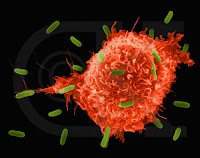For millions of people around the world affected by cancer, there is some good news coming out of Tel Aviv, Israel this past week. Researchers working on a collaboration project between the drug company Vaxil Biotheraputics and Tel Aviv University have developed a new therapy that targets a molecule found in 90% of all cancers. This therapy, done through a universal injection would allow patient's immune system to fight off common cancers, such as breast and prostate cancer.
Cancer is the leading cause of death worldwide and accounted for 7.6 million deaths (around 13% of total deaths) in 2008 according to the World Health Organization. The types of cancers most affecting people around the world include lung (1.37 m deaths), stomach (736,000), liver (695,000), colorectal (608,000), breast (458,000), and cervical cancer (275,000). A majority of these deaths, 70%, occurred in low and middle income countries, where treatment is less available and of lower quality. By 2030, if the current rate continues, the WHO projects over 13.1 million people will die of cancer worldwide. This new therapy out of Israel could significantly lower these numbers if it successful.

Within the United States, almost 12 million people currently have been diagnosed with a form of cancer as of 2008 according to the American Cancer Society. This total is roughy split between males with 5.5 million and women with 6.5 million patients. The highest prevalence being with breast cancer in women, which constitutes more than a sixth of all cancer patients.
Cancer arrises out of one single cell. Under certain conditions, the cell with undergo a transformation from a normal cell into a tumor cell through a multistage process. This progression from a pre-cancerous lesion to malignant tumor can be the result of the interaction of a person's genetic make up and three major external agents. The external agents being categorized as 1) physical carcinogens, 2) chemical carcinogens, and 3) biological carcinogens. Furthermore, cancer development incidence can rise dramatically with age, and is likely attributable to the build up of risk factors.
For all the environmental and genetic risk factors, and the increasing prevalence of cancer, a discovery of this nature is remarkable. Preliminary results from clinical trails have shown the vaccine can trigger an immune response in patients, subsequently reducing the levels of cancer. Researchers believe the vaccine could be used to combat small tumors if detected early enough and also help prevent the return or spread of disease in patients who have undergone alternative forms of treatment, such as surgery, chemotherapy, or radiation treatment.
 |
| Tel Aviv University |
This research is promising and let's hope that with further trials and further research, this vaccine will be able to come to market in the near future.
For more on the topic, please visit the following sources:
American Cancer Society:
http://www.cancer.org/Cancer/CancerBasics/cancer-prevalence
World Health Organization:
http://www.who.int/mediacentre/factsheets/fs297/en/
The Telegraph:
http://www.telegraph.co.uk/science/science-news/9191848/Universal-cancer-vaccine-developed.html

No comments:
Post a Comment